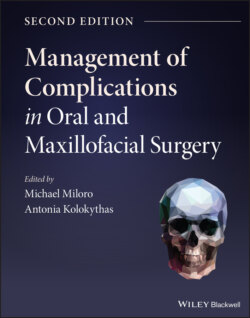Читать книгу Management of Complications in Oral and Maxillofacial Surgery - Группа авторов - Страница 35
Aspiration
ОглавлениеAspiration refers to the entry of substances such as blood, saliva, gastric contents, or foreign bodies into the lungs via inadvertent inhalation. Aspiration occurs due to decreased or absent protective airway reflexes and is exacerbated by decreased gastroesophageal tone. Patients with neuromuscular degeneration or history of stroke are at increased risk as are those undergoing sedation and general anesthesia. Additional risk factors include gastroesophageal pathology such as GERD (gastroesophageal reflux disease), hiatal hernia, or achalasia, as well as a history of esophageal surgery or gastric bypass [19]. The greatest risk from aspiration occurs with aspiration of gastric contents. This can lead to acute respiratory distress syndrome or a chemical pneumonia causing damage to the lungs from the low pH of gastric fluids and the presence of peptic enzymes. Either passive regurgitation of stomach contents or active vomiting during anesthesia can lead to aspiration. Any patient who begins to retch or vomit during an anesthetic procedure should be placed with their head lowered (Trendelenburg positioning) to prevent aspiration into the lungs, and any vomitus should be suctioned carefully from the mouth and oropharynx. Patients known or suspected to have aspirated vomitus should have their respiratory status carefully monitored as they may require elective intubation with lavage and suctioning of the bronchial tree. The role of steroids and antibiotic therapy in these patients has been questioned and they are not routinely administered. In the absence of signs indicating respiratory compromise, management of aspiration is expectant.
In the case of aspiration of a foreign body, the surgeon may make a careful attempt to visualize and retrieve the object if possible. A laryngoscope and MacGill forceps may be helpful in this situation. If the object cannot be visualized for removal, the patient's respiration should be monitored and supported as needed and the patient transferred to a hospital.
